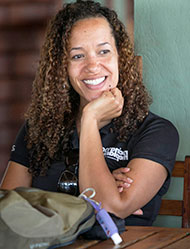Is it safe to go the distance?
Advice for people who want to get fit with long-distance running
Interest in high-intensity sports is growing, and running a marathon or half-marathon will likely be on many New Year’s resolution lists for 2017. There are definitely health benefits to running, but there are risks as well. We talked with sports medicine physician Brandee Waite about preparing for your first — or next — marathon.
What training guidance do you offer those who want to run a marathon?

Start slowly. I recommend increasing your mileage by no more than 10 to 15 percent per week to help avoid injury. Set some interim goals of completing first a 5K, then a 10K and then a half marathon if you are new to long-distance running. Joining a running club can put you on a good schedule to avoid injury while carefully ramping up your mileage. Local running shoe stores typically have information on options. Also, it is very important to stretch after you run.
What are the health requirements of starting such a rigorous training program?
Check with your primary care doctor to get clearance, especially if you haven’t seen your doctor in a while or if you have heart disease or another medical issue. Remember that fitness/running/jogging and walking programs can be designed to accommodate almost any fitness level and can actually help improve chronic conditions such as diabetes and high blood pressure.
What are the most common injuries that come with training for or while running a marathon?
Brandee Waite is a physician with the UC Davis Sports Medicine Program, which offers fitness assessments, training guidance and injury treatment for all athletes — from weekend warrior to elite levels. She is currently a team physician for the Sacramento Republic FC professional men’s soccer team and has served as a physician for Olympic track-and-field athletes, professional and collegiate basketball teams, and professional dancers. Her research focuses on improving training programs and reducing injuries for ultra-marathoners, or those who choose to run beyond the 26.2 miles of a traditional marathon, often on the Earth’s roughest terrain.
The top two are Achilles tendinitis and runner’s knee, also known as patellofemoral syndrome or pain toward the front of the knee. A common reason for these conditions is increasing mileage too quickly. An evaluation of the runner’s technique and body alignment by a sports medicine specialist can help identify the cause and reduce symptoms. Physical therapy and a training break may be necessary if either issue becomes problematic.
We often hear about runners who get sick during a race. Is this just a part of the process or something that can be avoided?
Some people — but not everyone — get exertion-related stomach upset, abdominal pain, nausea or other gastrointestinal symptoms while running. This can be avoided by modifying pre-run and during-run meals, snacks, supplements and general diet. A sports nutritionist can help you figure out what works best for you.
We also hear sometimes about people who have more serious health outcomes during a race, like a cardiac event. Is this something that can be predicted and avoided?
Yes and no. People with conditions like coronary artery disease may be advised not to run and consider a walking program instead due to their increased risks of a major cardiac event. However, there are a certain number of people who are healthy, have no known heart disease risk factors and suffer a major cardiac event while running. It’s not always possible — even with the best medical testing — to detect every person this might happen to. Studies have shown that some people who experience cardiac arrest during sports had symptoms in advance, such as chest pain, shortness of breath or symptoms that seem like the flu. It is important to be aware of these warnings — keeping in mind that they may be subtle — get them checked out and avoid exertion until you have been cleared to train again. It is also really important for everyone, and I literally mean everyone, to learn CPR. It can save lives.
How can we best listen to our bodies when we’re actively pushing ourselves to the edge of our physical limits?
If you feel horrible, slow down or stop. If you start to feel better, it’s probably OK to keep going. If you don’t start to feel better, do not push yourself into extreme pain or fatigue. The more you train, the more you can distinguish between just feeling poorly from a tough run versus feeling something more serious. You do need to push beyond comfort sometimes to advance training, but if you train properly, you should be able to finish a race without major problems.
How does the discipline and practice of running carry over to, or impact, other aspects of a runner’s life? What is the greatest takeaway for you, or that you’ve commonly heard?
Some people have mentioned that running has improved their mood, depression or anxiety, or that it has even improved their relationships because they are happier with themselves. Some have found the discipline of running — and participating in other sports as well — gives them a grounding to be more disciplined in other areas of their lives. Many people, especially ultra-distance runners, tell me that the greatest benefit is in the people they meet and the friends they make in the training groups, on the trails or during the races. I have immensely enjoyed the travel and the incredibly adventurous people I’ve met as the medical director for running events on every continent — yes, even Antarctica!
